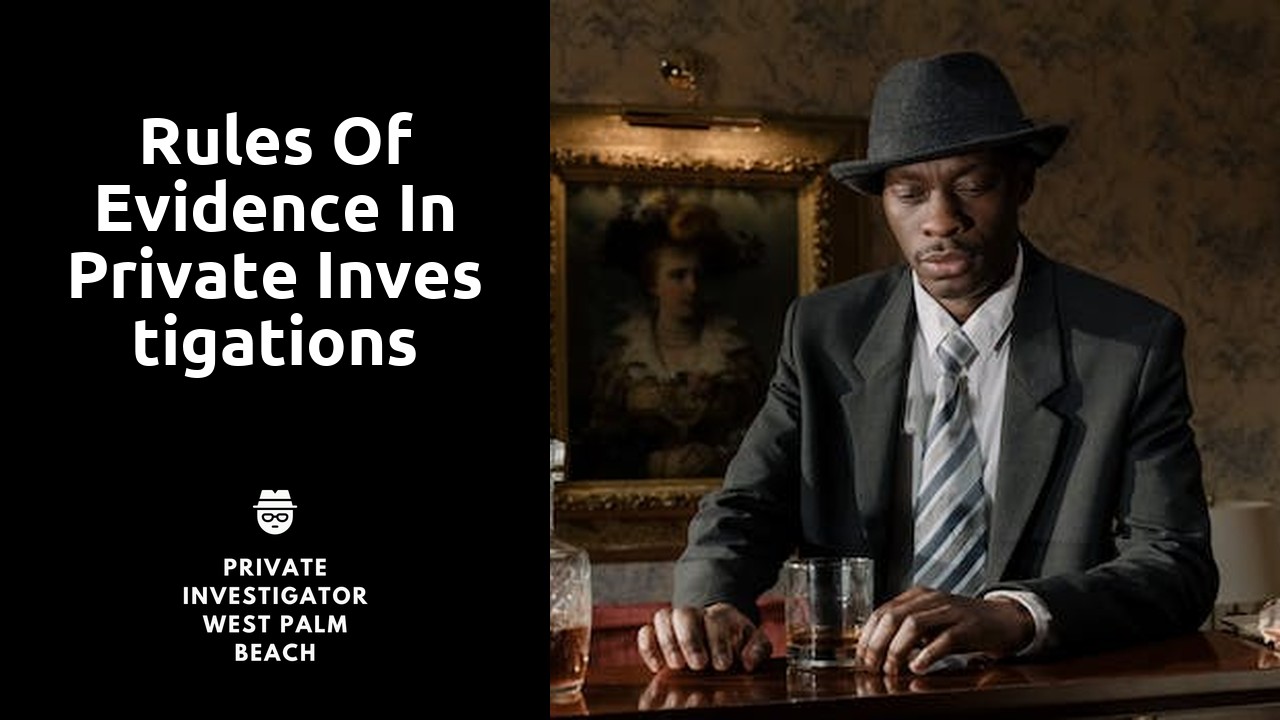
Rules of Evidence in Private Investigations
Understanding the Importance of Evidence in Private Investigations
Evidence plays a crucial role in private investigations, serving as the foundation upon which cases are built. Without solid evidence, the truth may remain elusive, leaving investigators and their clients in a state of uncertainty. Therefore, understanding the importance of evidence is paramount in conducting successful private investigations.
In the realm of private investigations, evidence serves multiple purposes. Firstly, it helps investigators establish the credibility of their findings and substantiate their claims. Whether it is in the form of witness statements, photographs, or documents, evidence provides the necessary proof to support the conclusions drawn from the investigation. Additionally, evidence also serves as a means of validating the investigators' methodology, ensuring that their investigative approach is sound and reliable. By presenting solid evidence, investigators not only strengthen their case but also gain the trust and respect of their clients and the legal system.
Uncovering the Truth: How Evidence Shapes Private Investigations
Evidence plays a pivotal role in shaping private investigations, serving as the backbone that uncovers the truth behind a case. Without concrete evidence, mere speculation and assumptions would cloud the investigation process, leaving room for doubt and uncertainty. Each piece of evidence collected holds immense power, painting a clearer picture of the events that transpired and providing the necessary substantiation for the claims made.
To understand the significance of evidence in private investigations, one must recognize its ability to establish credibility and support the findings of the investigation. Evidence serves as a means of validation, allowing investigators to build a solid case that can withstand scrutiny in a court of law. It acts as a guiding light, guiding the investigation towards the truth and ensuring that justice is served. Moreover, evidence provides the necessary foundation for making informed decisions and taking appropriate action, ensuring that the investigation is conducted meticulously and with integrity.
The Key Role of Evidence in Building a Strong Case
Evidence plays a crucial role in building a strong case in private investigations. It serves as a backbone that supports the entire investigation process and ultimately determines the outcome of a case. Without solid evidence, even the most compelling theories and assumptions hold little weight in a court of law.
In private investigations, evidence can come in various forms, such as documents, photographs, videos, witness statements, and physical objects. It is the responsibility of the investigator to gather, document, and preserve this evidence in a meticulous and organized manner. Each piece of evidence must be carefully analyzed and evaluated to determine its relevance and authenticity, ensuring that only the strongest and most valid evidence is presented to support the case. By doing so, the investigator strengthens their arguments, convinces the jury or judge, and increases the likelihood of a favorable outcome for their client.
Navigating the Legal Landscape: Guidelines for Collecting Evidence in Private Investigations
Private investigations require a meticulous approach to collecting evidence that adheres to the legal landscape. It is essential to follow specific guidelines to ensure that the evidence gathered is admissible in court and holds up under scrutiny. These guidelines exist to protect the rights of all parties involved, maintain the integrity of the investigation, and facilitate a fair and just legal process.
One crucial guideline is to obtain evidence legally, without infringing on anyone's rights or violating any laws. It is imperative to conduct the investigation within the boundaries of the legal system, respecting privacy laws and adhering to rules regarding search and seizure. This means obtaining warrants when necessary, seeking consent when appropriate, and avoiding any actions that may be considered illegal or unethical. By adhering to these guidelines, private investigators can ensure that the evidence collected is valid and will withstand legal challenges, ultimately bolstering the strength of their case.
Mastering the Art of Documentation: Essential Practices for Recording Evidence
When it comes to private investigations, mastering the art of documentation is a crucial skill for investigators. Recording evidence accurately and meticulously is essential for building a strong case and ensuring its admissibility in court. Without proper documentation, the validity and credibility of the evidence can be called into question, potentially jeopardizing the outcome of the investigation.
One essential practice for recording evidence is to be thorough and detailed in documenting all relevant information. This includes recording the date, time, and location of the evidence collection, as well as any observations or circumstances surrounding the evidence. It is important to document all interactions and conversations related to the evidence, including the names and contact information of any individuals involved. By providing a comprehensive account of the evidence, investigators can create a clear and complete picture for themselves and others who may review the evidence later.
Validating Evidence: Ensuring its Admissibility in Private Investigations
Validating evidence is a critical step in ensuring its admissibility in private investigations. In order for evidence to hold up in a court of law, it must meet certain standards and requirements. This process involves carefully examining the evidence to verify its authenticity, relevance, and reliability.
One important aspect of validating evidence is establishing its authenticity. This involves confirming that the evidence is genuine and has not been tampered with or altered in any way. The integrity of the evidence is crucial, as any doubts or suspicions regarding its authenticity can seriously undermine its value and potential impact on a case. Proper documentation and chain of custody procedures are essential in proving that the evidence is indeed what it claims to be.
Related Links
Understanding Confidentiality and Client Privilege in Private InvestigationFourth Amendment and Private Investigation
Integrating Psychological Understanding in Investigations
Using Psychological Profiling to Solve Cases